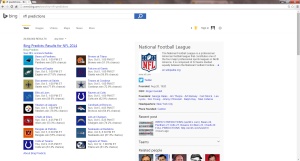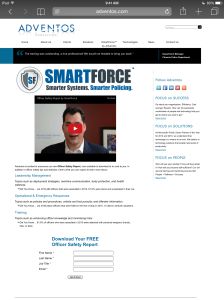Algorithmic crime-fighting, based on predictive technology makes makes me nervous. Let me just say that upfront.
The Phoenix Police Department probably predicted I would write that…
It appears that Phoenix Police Department uses predictive analytics, as at least a tool to aid them in policing the sixth most populous city in the United States. My Open Records request with the Phoenix Police Department is pending, without a timetable for completion. While we wait, I think it is appropriate to look at what we do know about predictive policing.
Predictive Policing
There is not a whole lot of academic information on predictive policing, in part because predictive analytics is such a young field in and of itself.
Probably the best definition I could find of this mysterious topic came from the RAND Corporation, a non-profit global policy think tank.
Predictive policing is the application of analytical techniques—particularly quantitative techniques—to identify likely targets for police intervention and prevent crime or solve past crimes by making statistical predictions.
— Predictive Policing, RAND Corporation, at *5.
Through an analysis of existing academic papers, vendor literature, and police use of predictive analytics the RAND Corporation came up with four types of predictive policing.
- Predicting crimes – forecasts places and times with an increased risk of crime
- Predicting offenders – potential for an individual to re-offend in the future
- Predicting perpetrators identities – profiling likely offenders
- Predicting victims of crimes – identify groups or, in some cases, individuals who are likely to become victims of crime.
— Predictive Policing, at *6.
Some law enforcement agencies who employ predictive analytics may use one or all of these tactics to aid in their investigations. Each law enforcement agency is different and may choose different strategies that will assist with their unique situation.
But why do law enforcement agencies need software? Ask an experienced law enforcement officer where crimes are likely to take place, who could be a potential offender, and who is likely to be a victim and they probably could give you an answer. That knowledge is based off of personal experience and instincts, not statistical data.
That is where the computers and the number crunching software come into play. The computer can combine the experiences of all of the officers, across time, and create a master list, of sorts. Also, the software will not forget. Details will not fall through the cracks like they can with humans.
Predpol, software that is created to predict property crimes, is developed based on an algorithm that’s used to predict earthquakes, according to Comptuerworld.
Other algorithms used by other companies may be developed differently, but I think it is interesting to think about technology used to predict earthquakes being applied to crime.
Phoenix Police
There is not a lot of information in the public domain about the Phoenix Police use of predictive analytics. Here is the little information I could piece together.
First, it appears Phoenix Police uses services from Adventos Consulting, see screenshot below. Judging from its website it looks like the majority of the business is information management. One part of their website does claim it offers predictive policing capabilities. The website has rotating banners at the top (that black strip) where at least two employees of the Phoenix Police Department give anonymous endorsements.
The Phoenix Police has at least investigated predictive policing, if not fully implemented it into the department. In 2011, Phoenix Assistant Police Chief Kevin Robinson interviewed for the then vacant Police Chief position. Mr. Robinson served as an Assistant Police Chief in the Phoenix Police Department from 2000-2011 (this is when he applied for the position of Police Chief). In his application Mr. Robinson details some of his experience with predictive policing. “I worked hand-in-hand with experts in the field of Predictive Analytics..Our goal was to, without additional costs to the organization, research potential opportunities within the police department where predictive analytics software could best be applied in our on-going efforts to reduce crime.” at *6.
It is not clear whether and to what extent the Phoenix Police may have adopted predictive policing into the Department. Hopefully, more will be clear after the public records request is fulfilled.
Predictive Analysis Used in Other Areas
Police Departments are not the only organizations that use predictive technology. As computers become quicker and data becomes more abundant predictive analytics may be used more often.
Microsoft’s virtual assistant Cortana uses predictive technology currently to predict NFL games and the winner of the tv show Dancing with the Stars. Cortana is predicting every NFL game this year and looking to build upon its success correctly picking 15 out of 16 World Cup knockout stage games in the summer of 2014.

Through five weeks of the NFL season Cortana’s record is 49-27. Let’s put that in perspective by comparing it with the football experts from ESPN who also predict every game. Out of the thirteen football picker panelists on ESPN only four of them have a record equal to or greater than Cortana (Allen, Joyner, Jackson and Carter). That puts Cortana roughly in the 69th percentile of expert football pickers, from an admittedly small sample size.
The predictive software seems to give pretty solid betting advice, but it still has not set it self apart from it’s human counterparts.
Social Networking
Remember Friendster, the really old, now defunct social networking website. If you are able to remember, you are better than me.
Well recently, researchers studied publicly available data archived from Friendster. As reported in Wired.com, a whole bunch of information could be gleaned about non-users of Friendster. Yes, the researchers could predict with a certain degree of accuracy characteristics of individuals who interacted with profiled users of Friendster.
They found that if Friendster had used certain state-of-the-art prediction algorithms, it could have divined sensitive information about non-members, including their sexual orientation. ‘At the time, it was possible for Friendster to predict the sexual orientation of people who did not have an account on Friendster.’
This is scary stuff for privacy rights. The study which can be found here for free, goes into depth about the predictive analytics used in combination with the Friendster data. The details of the study are beyond the scope of this article.
The point being if police departments scraped publicly available data available from social media accounts within their jurisdiction they may have a wealth of information to use with predictive analytics. It could be scary what law enforcement could come up with in that sort of situation. Think about if a law enforcement agency used the publicly available information from just Twitter and Facebook and plugged it into a predictive algorithm…. Okay, maybe let’s not think about that quite yet. I might have nightmares.
Conclusion
Predictive analytics is a quickly developing with its accuracy. The software is starting to challenge some of the best human in their field to predict complex events.
There is no doubt this can be very powerful technology. Indeed it could be a huge boost to cash-strapped law enforcement agencies. The potential abuse of civil rights are enormous. It is important law enforcement agencies are forthright with their communities about their use of such technologies.

Like other things that the police become relied on, this will turn into a gospel for them and a lot of innocent people will become the victims of police zeal
My first thought also was this could easily be abused. However, most of the literature I read in preparation for writing this article seemed to suggest otherwise.
Either way, we should find out more once the Phoenix Police Department fulfills my public records request.